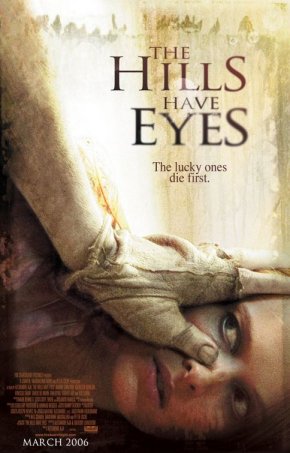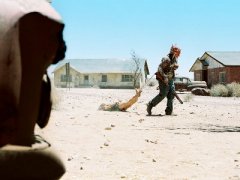|
The
Hills Have Eyes
It would be so easy to rail on Alexandre Aja’s remake
of Wes Craven’s 1977 grindhouse classic The Hills
Have Eyes, so why not? Well it turns out that Aja’s
turn in the desert comes off far better than one could have
hoped, and although it never manages to rise above its predecessor,
it also never steers into territory that takes away from
Craven’s original film.
Take
it or leave it, the original Hills was basically
aping the utterly brilliant Texas
Chainsaw Massacre,
so it seems somewhat pointless to praise one version of
the film and damn the other in the process. Both suffer
from the same complications in comparison with Hooper’s
film, yet both manage to rise above the crop of throwaway
schlockers unleashed time and again upon moviegoers.
Horror
remakes are becoming a dime a dozen these days, and when
studios aren’t stripping down foreign imports to appeal
to American audiences they seem to be mining homegrown efforts
for re-visitation.
Case
in point: Marcus Nispel’s 2003 disaster, a
remake of The Texas Chainsaw Massacre all suited
up to appeal to the TRL masses.
To Nispel’s
credit, the film looked snazzy enough, thanks in part to
slick production resources, but the issue is that the raw,
unpretty, realism of Hooper’s original only helped
drive home the point of the film. Nispel missed the boat
completely, and his characters reflected his ignorance much
to the dismay of true fans of the original.
This
is great to get out there, but we’re here to discuss
Aja’s stab at Hills aren’t we? Sure
enough, Aja brings a heightened and polished look to the
film, which goes against the homegrown look of grindhouse
horror, but he also manages to bring a feeling of invested
tension to the film. Known for his gory breakout film Haute
Tension, or High Tension, it seems only natural
that Aja was chosen to helm the remake.
The
plot and set-up are simple to say the least. An all-American
family consisting primarily of churchgoing Republicans,
plus a converted ex-hippie, are traversing the desert on
the way to California. The Carters, headed by parents Bob
and Ethel (Ted Levine and Kathleen Quinlan), are not happy
about their trip, but choose to endure it none the less
at their parents’ behest.
The
rest of the family is rounded out by Doug and Lynne Bukowski
(Aaron Stanford and Vanessa Shaw), and Lynne’s younger
siblings Brenda (Emilie de Ravin) and Bobby (Dan Byrd).
Early
on, we are introduced to a host of possible conflicts within
the group, namely that Doug feels isolated by his father-in-law,
Bob, who cuts him down for being a Democrat whenever he
gets the chance. The younger siblings seem to be a bit stifled
by their parents’ suburbanite hang-ups.
Ultimately
throwaway in the end, Aja’s take on The Hills
Have Eyes still manages to get under viewers’
skin. Sure, the motifs are repetitive by today’s standards,
but Aja still manages to make us care about these characters.
Straying
ever so slightly from Craven’s film, Aja places less
emphasis on paralleling the actions of both the nuclear
family and their mutated counterparts. This seems to chisel
away at some of the ideas that made the original stand out,
but it sort of works.
Instead
of working in parallels, Aja develops couplings, basically
by pairing characters with one another to help heighten
the suspense and terror as the killings begin. Members of
the family are tortured, raped, and brutally dispatched
right in front of one another unflinchingly. This sort of
practice is commonplace in horror films, but Aja uses his
couplings to bring an added layer of tension to each scenario
by giving us subtle entry points into mourning each character’s
passing through the eyes of their counterparts.
Things
boil down in such a way that has come to be expected these
days, but the film remains enjoyable even when it jumps
the rails to wrap things up. One complaint comes with the
closing shot, which feels as though it were tacked on to
leave room for further moneymaking plans (read: sequels).
Although
comparisons between families are abandoned, the deconstruction
of red and blue state sensibilities is definitely hinted
at within Aja’s film -- and we'll see which sensibilities
prevail in making this movie a success or failure.
Rating:

|








